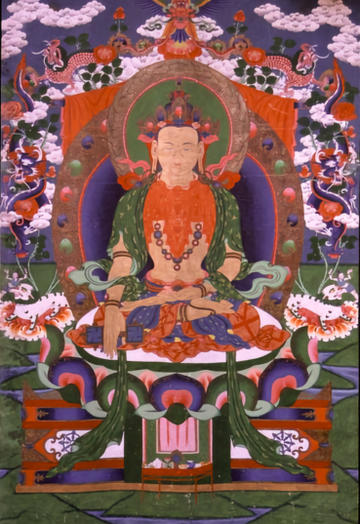The Biography of Tönpa Shenrab Miwo, mythical founder of the Yungdrung Bön
ʼDus pa rin po che’i rgyal dri ma med pa gzi brjid rab tu ʼbar ba’i mdo
Introduction
This is a twelve-volume biography of Tönpa Shenrab Mibo (sTon pa gshen rab mi bo), mythical founder of the Bön religion. The second volume contains the rGyal bus bka’ khrims bstsal ba’i mdo (Sutra of the prince’s law-giving). Kvaerne (1986: 37) dates the text to the late 14th century, on the basis that the dgongs gter (mind treasure teaching) was revealed to Khyung po blo ldan snying po, who was born in 1360 (see also Kvaerne 1971: 232).
Download this resource as a PDF:

© Himalayan Art Resources
Sources
gZi brjid. 1978. Dolanji: Patshang Lama Sonam Gyaltsen. [Publisher’s note: reproduced from an ancient manuscript from bSam gling in Dolpo, Nepal. BDRC: W1KG587
mDo dri med gzi brjid. 2000. Lhasa: Bod ljongs bod yig dpe rnying dpe skrun khang.
mDo dri med gzi brjid (12 volumes). BDRC: W23434
References
Kvaerne, Per. 1971. A chronological table of the Bon po: the bstan rcis of Nyi ma bstan ʼjin, Acta Orientalia 33: 206–82.
__. 1986. Peintures tibétaines de la vie do sTon pa gchen rab, Arts asiatiques 41: 36–81.
Ramble, Charles. 2006. Sacral Kings and Divine Sovereigns: Principles of Tibetan Monarchy in Theory and Practice. In D. Sneath (ed.) States of Mind: Power, Place and the Subject in Inner Asia. Bellingham, WA: Center for East Asian Studies, Western Washington University, pp. 133–39.
Outline
Most of the rGyal bus bka’ khrims bstsal ba’i mdo sutra sets the scene for the discourse of the prince, Shenrab Mibo. He then expatiates on the subject of statecraft. He announces that the royal law has two aspects, the Bön law of the ultimate truth and the law of conventional truth.
The text emphasizes the need for there to be a king, but it also asserts that the priest is superior to the king.
Extracts
The following are drawn from the manuscript reproduced on TBRC (W23434). Volume two is found at pages 395–634 of the pdf generated by that web-site. The manuscript, itself, contains some duplicate numbering, so we include here both the page number found on the manuscript and the number of the pdf file.
The translations are largely based on those of Ramble (2006) and we gratefully acknowledge his permission to reproduce parts of them here.
The prince is addressing an assembly of the living beings of the three worlds.
[p. 477, pdf 105]
རྒྱལ་པོའི་ཁྲིམས་ལ་རྣམ་པ་གཉིས་ཡིན་ཏེ། དོན་དམ་དངོས་པོར་བདེན་པའི་ཁྲིམས་དང་། ཀུན་རྫོབ་མཚན་མ་བདེན་པའི་བཀའ་ཁྲིམས་གཉིས། དོན་དམ་བདེན་པའི་བོན་ཁྲིམས་ལོགས་སུ་འབྱུང་། འདི་ནི་ཀུན་རྗོབས་མཚན་མའི་བཀའ་ཁྲིམས་སྟོན།
The royal law is twofold, comprising the Bon law of ultimate truth and the law of conventional truth. The Bon law of ultimate truth is dealt with separately. I shall now present the law of conventional truth.
[p. 477–78, pdf 105–06]
སྤྱིར་ན་སྲིད་པ་གསུམ་གྱི་སེམས་ཅན་ལ།
དབང་ཆེན་རྒྱལ་པོ་མེད་ན་སྣང་སྲིད་འཆོལ་བུར་འགྲོ།
གཟའ་ཆེན་ཉི་ཟླ་མེད་ན་སྐར་ཚོགས་དོན་མི་ནུས།
ཟིལ་གནོན་ཁྱུང་ཆེན་མེད་ན་འུག་པའི་སྤུ་རུ་སླང་།
ཀང་ཀ་རྒོད་པོ་མེད་ན་ཏི་ཏས་གཤོག་རྒྱང་བྱེད།
གསུང་སྙན་ཁུ་བྱུག་མེད་ན་ལྕོ་གའི་འགྱུར་སྐད་མཁས།
དཔའ་རྩལ་སེང་གེ་མེད་ན་འཁྲོ་བའི་གདོང་བ་གཉེར།
རིས་བཀྲ་སྟག་མོ་མེད་ན་ཝ་མོའི་འཔྲལ་འཛུམ་སྟོན།
Generally, if the creatures of the Three Worlds
Had no powerful king, the polity would crumble.
Without the great planets and the sun and the moon, the hosts of stars would not shine.
Without the resplendent garuda, it is the owl’s feathered horns that would rise.
Were there no vulture, the quail would spread its wings.
Without the melodious voice of the cuckoo, the lark would be the sweetest singer.
In the absence of the majestic lion, it would be the jackal that snarled.
But for the striped tiger, the fox would openly smirk.
[p. 478, pdf 106]
ཁ་དྲག་བསེའུ་མེད་ན་ཚེ་དེ་ལག་པ་རྡེབ།
ངར་ཆེན་གཡུ་འབྲུག་མེད་ན་བུང་པས་ཟེར་སྐད་ཆེ།
སྟོབས་ལྡན་གླང་ཆེན་མེད་ན་བ་གླང་གད་ལ་འདྲེ།
ཤུགས་ལྡན་རྟ་མཆོག་མེད་ན་ལྷོ་བསེ་བང་སྣ་རིང་།
དུག་འཇོམ་རྨ་བྱ་མེད་ན་ཙུ་ཙེས་ཁ་དོག་ལེགས།
དཔག་བསམ་ལྗོན་པ་མེད་ན་ཏ་ལ་སྐྱེ་བ་བཟང་།
ལྷ་དབང་རྒྱ་བྱིན་མེད་ན་ཉེ་དབང་གོང་ལ་འཕྱོ།
ཐང་བཟང་སླག་ཆེན་མེད་ན་ལྷ་མིན་དམག་ཚོགས་འཐོར།
གཙུག་ན་རིན་ཆེན་མེད་ན་གདོལ་བ་མགོ་ལོ་མཐོ།
དབུས་ཀྱི་ལྷུན་པོ་མེད་ན་རི་བྲན་འཐོར་བུ་འགྲོ།
འཁོར་ལོ་བསྒྱུར་རྒྱལ་མེད་ན་རྒྱལ་འབངས་དབྱེ་བ་མེད།
Without the mighty rhino the goat would paw the ground.
Without the thunderous roar of the turquoise dragon the buzzing of the bees would be the loudest sound.
Without the mighty elephant, it would be the bull that charged.1
Were it not for the powerful steed, the southern rhino would run the fastest.
Were it not for peacock, that overcomes poison, the parakeet’s plumage would be the most beautiful.
Without the wish-fulfilling tree, the palm would be the finest.
Were it not for powerful Indra, the vassal king Vishnu would stand supreme.
Without Thang bzang slagchen, the army of the Asuras would be scattered.
Without gTsug na rin chen (king of the nagas), gDolba would be highest.
Without Mount Meru at the centre, the minor hills would form no pattern.
Without a wheel-turning king, the king and subjects would be indistinguishable.
[p. 478–79, pdf 106–07]
དེ་ཕྱིར་དབང་ཆེན་རྒྱལ་པོའི་བཀའ་ཁྲིམས་གཙོ།
རྒྱལ་པོའི་བཀའ་ཁྲིམས་འཇག་ན་ཞིང་ཁམས་བདེ།
གསེར་གྱི་ཐིག་ཆེན་དྲང་ལ་དབང་ཁ་གཏད།
གས་དང་ཡོན་བོར་སོང་ན་ཐབས་ཀྱིས་བཅོས།
དྲང་པོར་དྲང་ཞིང་འཇིག་རྟེན་ཀུན་ན་བདེ།
ཡོ་དང་འཁྱོག་པོར་སོང་ན་ཀུན་དང་འགལ།
རྒྱལ་པོ་རྒྱལ་ས་གནོན་པ་རྒྱལ་པོའི་ཁྲིམས།
གཡོ་བསྐྱོད་མེད་པར་གནས་པ་ཀུན་ལ་བརྗིད།
This is why the laws of the powerful king must be sovereign.
The promulgation of royal law will bring peace to the land.
The straight and golden rule is a constraint on power.
If it becomes split or warped, it must be skilfully repaired.
When people are led along the straight path of justice there is peace in the world.
If they follow a crooked and devious path conflict will reign everywhere.
The law for a king is to wield power from his throne.
By not stirring up dishonesty, he will bring glory to all.
The text continues with advice to the king on how to rule well: he should make clear pronouncements, take wise counsel, take care about the succession, and behave appropriately towards the different classes of society.
The prince then gives advice on the ‘law’ that relates to other people: the law for the queen, the law for different ministers and army leaders, and the laws for the common people, appropriate to their positions in society.
[p. 483, pdf 111]
ཉོན་ཅིག་སྲིད་པ་གསུམ་གྱི་སེམས་ཅན་དང་།
བདག་གི་འཁོར་དུ་གཏོགས་པ་ཐམས་ཅད་ཀུན།
འཇིག་རྟེན་ཁམས་ན་རྒྱལ་པོ་གཉན་ལགས་ཀྱང་།
རྒྱལ་པོའི་གོང་དུ་ཆེ་བ་བླ་མཆོད་ཡིན།
ཚང་རྒྱུད་ཞིང་ལས་རི་རབ་མཐོན་ལགས་ཀྱང་།
དེ་བས་གོང་དུ་དཔག་བསམ་ལྗོན་ཤིང་ཡིན།
སྲིད་པའི་རྩེ་ལ་བྱ་ཁྱུང་གནས་ལགས་ཀྱང་།
གསུང་དབྱངས་ཀུན་ལ་སྙན་པ་ཁུ་བྱུག་ཡིན།
སྐྱེ་མོའི་ཚལ་ལ་ཤང་ཤང་བརྗིད་ལགས་ཀྱང་།
སྐད་འགྱུར་སུམ་བརྒྱ་སྒྲོག་པ་ནེ་ཙོ་ཡན།
Listen, creatures of the Three Worlds,
And all you who are members of my retinue.
Although the king may have supreme power in this world,
Even higher than the king is the priest.
Although Mount Meru may be higher than any other in the universe,
Even above it is the Wish-fulfilling tree.
Although the garuda dwells at the summit,
The most melodious voice is that of the cuckoo.
Although the shang bird is the most resplendent creature of the forest,
The parrot has three hundred songs.
[p. 483–84, pdf 111–12]
བར་སྣང་མཁའ་ལ་གཡུ་འབྲུག་ངར་ཆེ་ཡང་།
བཙུན་སྙན་བརྗིད་ལྡན་ཀ་ལ་བིང་ཀ་ཡིན།
ཁ་བ་གངས་ལ་སེང་གེ་འགྱིང་ལགས་ཀྱང་།
མང་ལ་ཁས་དྲག་བསེའུ་རུ་གཅིག་ཡིན།
རྒྱ་མཚོའི་གླིང་ལ་ཆུ་སྲིན་གཏུམ་ལགས་ཀྱང་།
སྟོབས་ཤུགས་ཐོག་པ་མེད་པ་ཨུན་ཆེན་ཡིན།
མེ་ཏོག་གླིང་ལ་ཨུད་འབར་དཀོན་ལགས་ཀྱང་།
སྐྱེ་འགྲོ་གསོ་བ་མན་དྷ་ར་བ་ཡིན།
Although the turquoise dragon may roar the loudest in the sky,
The kalapinga bird has the most sweetly melodious voice.
Although the lion is the most majestic among the glaciers,
The most fearsome roar is that of the one-horned rhinoceros.
Although the water demon rages in the oceans,
The great conch [the killer of water-spirits] has unsurmountable power.
In a sea of flowers, the Udumbara lotus may be rare,
But the Tree of Paradise nourishes living creatures.
[p. 484, pdf 112]
སྨན་མཆོག་རྒྱལ་པོ་བཟང་དྲུག་ཡིན་ལགས་ཀྱང་།
ཡོངས་ལ་སྙོམས་པ་རྣམ་བར་རྒྱལ་བ་ཡིན།
མིའི་རྗེ་བོ་དབང་པོ་ཆེ་ལགས་ཀྱང་།
དེའི་ལམ་འདྲེན་སྟོན་པ་སངས་རྒྱས་ཡིན།
དེ་ཕྱིར་མི་ལས་ལྷ་རུ་གཉེན་པར་བྱ།
རྒྱལ་ཁྲིམས་གསེར་གྱི་ཐིག་ཆེན་འོག་ཏུ་གནོན།
བོན་ཁྲིམས་དར་གྱི་མདུད་སོ་གོང་དུ་སྐྱོང་།
Although ‘The King of Six Excellent Ingredients’ is a powerful medicine,
The ‘Universal Equalizer’ is supreme.
Although the lord of men is the most powerful,
His guide is the Enlightened Teacher.
For that reason, associate with the gods more closely than with men.
The great golden rule of the royal law bears down [on those below],
But the silken knot of the Bön law raises [them] up.
The text continues with instructions to support religious institutions.
[p. 485, pdf 113]
ཁྲིམས་ལ་འགལ་ན་ལས་ཀྱི་ཆད་པ་ཆོད།
Those who contravene the law will suffer the punishment of karma.
It continues with further elaboration of the duties of different classes of people.
Footnotes:
- This is not certain. ↩




